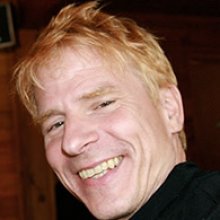 September 23, 2014 - 4:00 pm to 5:00 pm
September 23, 2014 - 4:00 pm to 5:00 pm Dr. Christof Koch, Chief Scientific Officer - Allen Institute for Brain Science
Abstract:
The science of consciousness has made great strides by focusing on the behavioral and neuronal correlates of experience. However, such correlates are not enough if we are to understand even basic facts, for example, why the cerebral cortex gives rise to consciousness but the cerebellum does not, though it has even more neurons and appears to be just as complicated. Moreover, correlates are of little help in many instances where we would like to know if consciousness is present: patients with a few remaining islands of functioning cortex, pre-term infants, non-mammalian species, and machines that are rapidly outperforming people at driving, recognizing faces and objects, and answering difficult questions. To address these issues, we need a theory of consciousness – one that says what experience is and what type of physical systems can have it. Giulio Tononi’s Integrated Information Theory (IIT) does so by starting from conscious experience itself via five phenomenological axioms of existence, composition, information, integration, and exclusion. From these it derives five postulates about the properties required of physical mechanisms to support consciousness. The theory provides a principled account of both the quantity and the quality of an individual experience, and a calculus to evaluate whether or not a particular system of mechanisms is conscious and of what. Moreover, IIT can explain a range of clinical and laboratory findings, makes a number of testable predictions, and extrapolates to a number of unusual conditions. In sharp contrast with widespread functionalist beliefs, IIT implies that digital computers, even if their behavior were to be functionally equivalent to ours, and even if they were to run faithful simulations of the human brain, would experience next to nothing.
Bio:
Born in the American Midwest, Christof Koch grew up in Holland, Germany, Canada, and Morocco. He studied Physics and Philosophy at the University of Tübingen in Germany and was awarded his Ph.D. in Biophysics in 1982. After 4 years at MIT, Christof was a Professor in Biology and Engineering at the California Institute of Technology, in Pasadena, California from 1986 until 2013. In 2011, he became the Chief Scientific Officer at the Allen Institute for Brain Science in Seattle, where he is leading a ten year, high through-put effort of several hundred scientists building brain observatories to catalogue, map, analyze and understand the cerebral cortex in humans and mice. He loves books, dogs, climbing, biking and long-distance running.
Christof has authored more than 300 scientific papers and articles, eight patents and five books about the biophysics of nerve cells, attention, visual perception and the brain basis of consciousness. He has worked extensively with neurosurgeons, neuroscientists, physicists, computer scientists and philosophers and is an engaging and frequent public speaker. Together with his long-time collaborator, Francis Crick, Christof pioneered the scientific study of consciousness. His latest book is Consciousness – Confessions of a Romantic Reductionist.
Details
43 Vassar Street, MIT Bldg 46, Cambridge, 02139 United States

